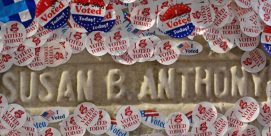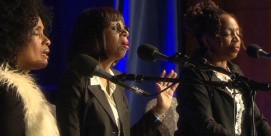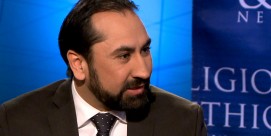Christopher Evans: Civil Religion and Populist Angst
 President Obama’s State of the Union address was an interesting display of two often competing themes in American history, mainly, a combination of civil religion mixed in with discernible streaks of political populism.
President Obama’s State of the Union address was an interesting display of two often competing themes in American history, mainly, a combination of civil religion mixed in with discernible streaks of political populism.
On one hand, the president presented a masterful work of political theater (a term used repeatedly by media pundits to describe the State of the Union address) made more dramatic by the power of the president’s delivery and the substance of his message. Yet behind the staged applause reflecting the obvious partisan divisions in Congress, the president succeeded in providing a vivid portrait of what historian Martin Marty in the 1970s called “prophetic civil religion.” Marty saw this incarnation of civil religion as an understanding that America carried a unique destiny among the family of nations. The nation, however, was also under divine judgment to realize that destiny by working toward a vision of collective justice for all Americans.
Understood as the interconnection of secular and religious language in public life, the rhetoric of civil religion in American history connects the political purpose (or, to use a theological term, “mission”) of a nation to a transcendent, divine meaning. This tradition of civil religion cuts two ways. One path has led to an uncritical belief in the infallibility of the United States as a political entity. Its laws, and the presuppositions of its laws, are seen as permanently set in stone, and America, as a nation under God, as beyond reproach because its mission is part of God’s divine providence. (This belief is reflected in the frequent argument that America was founded as a Christian nation.)
On one level, Obama’s address was low on religious rhetoric. Besides the usual “God bless America” coda that is part of every major political address, there was little overt reference to America’s religious heritage. Yet part of Obama’s genius as a politician is the way he embodies this larger tradition of prophetic civil religion. The civil religious tradition of Barack Obama connects the theme of American uniqueness to the idea that the nation stands under some form of providential judgment. This was part of the mastery of figures such as Abraham Lincoln, who was able to articulate the theme of America’s unique political destiny while also holding the nation accountable for the sins of slavery.
Not since John F. Kennedy has an American president tied together as skillfully as Obama the persistent theme that Americans, for all their political differences, share a common destiny as a nation, challenging people to work collectively to realize this vision. Part of the power of this tradition, when used effectively, is that it holds in tension a faith in a shared national destiny with the theme of a future hope, that is, the promise that with hard work and perseverance the future will be better than the present. As he has done so many times in the past, the president vividly made that connection for his audience last night.
The tradition of prophetic civil religion Obama embodies is not unique to American presidents, and one can point to a wide range of political and religious leaders in American history who have used elements of this heritage in their public rhetoric. Martin Luther King’s “I Have a Dream” speech was perhaps the classic embodiment of a public theology that affirmed the greatness of America’s past, while also summoning Americans to transcend the parameters of racism to realize a vision of justice for all.
Consistent with figures like King, Obama’s civil religion requires deep thought and meditation on the sacrifices of the past and the way these sacrifices are connected to creating hope in the future. There is a note of realism in Obama’s language (that came through loud and clear in his State of the Union), whereby lasting change is never easy but requires personal sacrifice as a means to reconnect with the larger meaning of the nation’s collective destiny.
I am sure the president is aware, however, that great leaders are ultimately judged not simply by their rhetoric but whether they can achieve results. Part of Obama’s problem is not simply the fact that he no longer holds a “super majority” in the senate. It is that his vision of America’s past and future has run headlong into a strong current of populist ideology. I am not against populism per se, yet for all the benefits of this tradition in communicating with a grassroots base (as Obama himself acknowledges), there is a dangerous tendency of this movement historically to define itself by what it is against, as opposed to what it stands for. Recent iterations (the much publicized Tea Party movement, for example) are part of a long line of movements in American history that play to the idea of a pristine past under attack. For all the power of Obama’s stress on the collective “we,” populism is a movement that often garners its strength from the importance of the individual “I.” While many on the left may want to dismiss the irrationality of populist angst, it’s a movement that lifts up another idiom of American political rhetoric: the sacred ideal of personal liberty. (In a number of ways, this populist theme has long been present in many traditions of American evangelicalism, long before the so-called reemergence of the Christian right in the 1980s and 1990s).
In the year ahead, it remains to be seen whether Obama will be able not only to negotiate the Democrat-Republican division, but whether he can connect his vision of prophetic civil religion, with its stress on the collective nature of America, to the very real economic hardships of millions of Americans who find in populist rhetoric a language that resonates with their immediate sufferings. In the past, Obama has understood that building a political movement requires more than a compelling vision of a collective identity. It also needs to speak to the concrete and specific hopes, fears, and dreams of ordinary Americans. As he contemplates the second year of his presidency, Obama’s legislative goals, in part, will need to hold these two competing ideals in creative tension.
Christopher H. Evans is the academic dean and Sallie Knowles Crozer Professor of Church History at Colgate Rochester Crozer Divinity School in Rochester, New York. He is also the author of Liberalism without Illusions: Renewing an American Christian Tradition (Baylor University Press, 2010).







